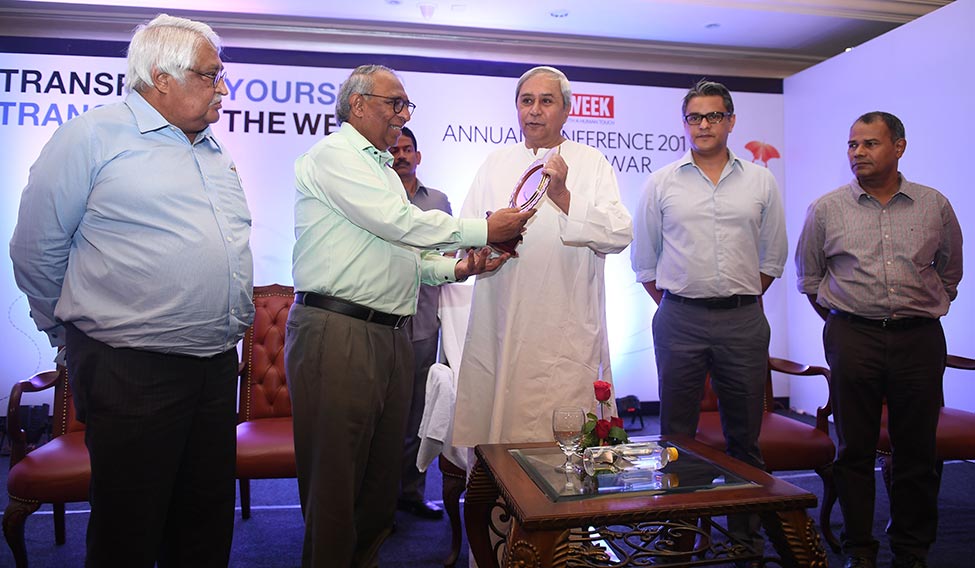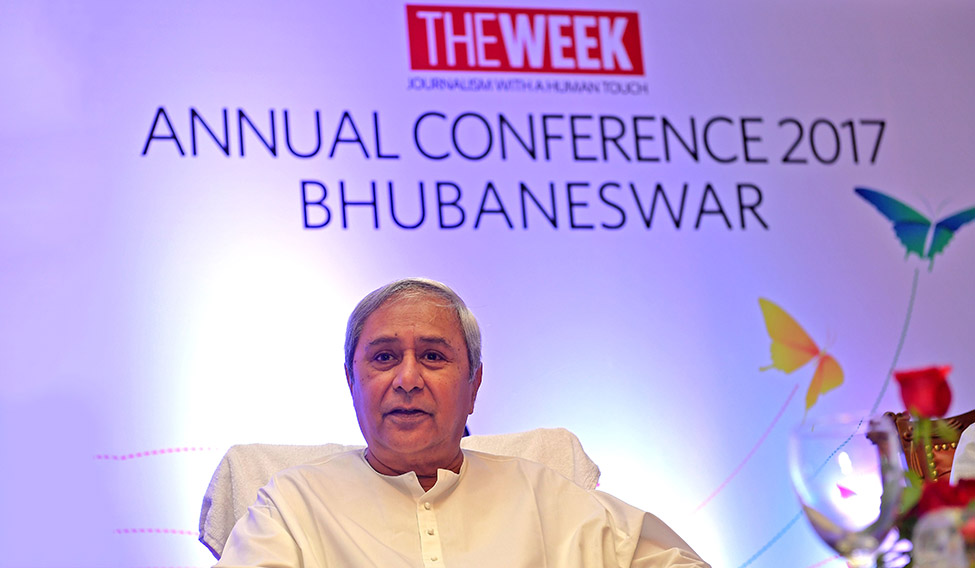Naveen Patnaik is known for his quiet ways. For a leader who has scripted a remarkable saga of success in Indian politics, the Odisha chief minister is low-profile and media shy, and a study in contrast when compared with his legendary father, Biju Patnaik, whose political legacy he carries forward. Patnaik named his party, the Biju Janata Dal, after his father, and initially leveraged the goodwill he had enjoyed in the state. Later, however, he started making his own success story.
Seen as a reluctant beginner and attacked by his critics for not knowing the ground realities of Odisha, Patnaik is into his fourth successive term as chief minister. He is clean and honest, and is regarded as an able administrator. While his critics pan him for being overly populist, Patnaik says the concerns of the common man are at the centre of his governance mechanism. He has formulated a success mantra that focuses on pro-poor policies.
Patnaik, who addressed THE WEEK’s annual conference in Bhubaneswar on November 10, emphasised that his government had always focused on the development and welfare of the common man. “In the last 17 years, Odisha has made some sweeping changes in its administration to make it dynamic, responsible and sensitive to the issues of the common man,” he said.
His popular pro-poor schemes include 25 kilo of rice at one rupee per month, construction of one million pukka houses, programmes for women and girls, and creation of a social security net for the workforce in the unorganised sector. Patnaik defended the populist measures and ruled out the concerns on fiscal prudence. “When we came to office in 2000, the state’s finances were in such a terrible state,” he said. “Now we have an excellent economy which has a number of anti-poverty programmes running successfully.”
The BJD, which initially was a part of the National Democratic Alliance, broke off the alliance with the BJP in 2009. The party won two assembly elections on its own after that, and Patnaik, 71, has established himself as the tallest leader in the state. As he enters the last leg of his current term, with assembly elections due in 2019, he faces a stiff challenge from his erstwhile ally. The BJP, which has been making aggressive moves, held its national executive meeting in Bhubaneswar in April. It increased its tally significantly in the local body polls earlier this year. Also, there is speculation that the BJP might try to poach leaders from the BJD.
Patnaik, however, said he did not see a tremendous growth for the BJP in eastern India and played down speculation about the saffron party attempting to poach his leaders. “I think the party is going to remain intact,” he said. Excerpts from an interaction with THE WEEK:
 Memorable event: Malayala Manorama Chief Editor Mammen Mathew presenting a memento to Naveen Patnaik. Editor Philip Mathew (left) and Senior Assistant Editor and Director Riyad Mathew are also seen | Salil Bera
Memorable event: Malayala Manorama Chief Editor Mammen Mathew presenting a memento to Naveen Patnaik. Editor Philip Mathew (left) and Senior Assistant Editor and Director Riyad Mathew are also seen | Salil Bera
When you took over, poverty in the state was at 59 per cent. Now it is somewhere around 34 per cent. How did you manage it?
We have taken more than eight million people from below the poverty line to above the poverty line. We have taken a number of steps as far as food security is concerned. Now, poor people get 25 kilo rice per month at one rupee; that looks after their food security. Also, we have built more than a million pukka houses, and shortly we will be completing another million pukka houses, which means that Odisha has no need of kuccha houses anymore. There are a number of other steps, like when we came to office in 2000, the state’s finances were in such a terrible state. We couldn’t even pay the salaries of the government servants. Now, we have an excellent economy which has a number of anti-poverty programmes running successfully.
With the BJP moving aggressively in eastern India, how do you see the role of regional parties in the coming years? Also, in 2014, the Modi government came to power with the slogan of cooperative federalism. Has it stood true to the slogan?
Cooperative federalism is very important. But after removing the Planning Commission, we find that the budget allocations from the Centre to Odisha are even less. So this has to be rectified. And, as far as regionalism is concerned, Biju Janata Dal is a regional party, and our priorities are all for the state’s interests. I don’t see tremendous growth for the Bharatiya Janata Party in eastern India.
Odisha has been at the forefront of reaching out to Southeast Asia and Sri Lanka from ancient times. Now in the present policy context, what role do you see for Odisha in India’s Act East Policy?
As far as the far east is concerned, because of our coastline and our ports, we have a natural advantage. And, now we have international flights as well to places like Kuala Lumpur.
You are one of the most powerful chief ministers in India, and you have been in power for the past 17 years. Do you see yourself as a prime minister probable?
My interest is focused only on Odisha. My concern is to keep working for the development and welfare of this state.
Do you find the Central government’s measures in fighting Naxalism effective?
I don’t think the Centre’s policy as far as Naxalism is concerned has been very successful. As far as the state government is concerned, we have tackled it, and from several districts affected by Naxalism, it is down to only two now.
How do you manage the low density of population in Odisha?
It has always been a fact that we have had a low population, and that continues. And we have a successful family planning programme as well. Also, infant mortality, for which we had the worst reputation in the country, is now above the national level, as is maternal mortality.
Do you apprehend any kind of poaching ahead of the 2019 assembly elections?
If you mean poaching in political parties, I don’t think that’s going to be very effective. I think the party is going to remain intact.
Odisha has plenty of natural resources and ports. Is your dream to make Odisha the Gujarat of the east?
I think Odisha has been doing very well 2000 onwards. We are no longer a BIMARU state. We are in the middle level as far as the states are concerned. And it has a very good recent history of development and welfare.
Demonetisation and GST have met with very strong criticism. Do you agree with the assessment that they have had a damaging impact on the country’s economy?
We supported demonetisation, if it was there for transparency, anti-corruption. But the process and procedure have been unsuccessful, as we have seen. And in GST, we still have to wait for what happens. But there are several flaws in that as well.
What are your memories of Jammu and Kashmir? Given your experience as a national leader, what would you recommend for the greater national integration of the state?
I have always had very fond memories of Jammu and Kashmir. My mother was from there. But I haven’t visited it for the last ten years when times had been more turbulent. I think the concerns of the people of Jammu and Kashmir should be treated very sympathetically. And more of an effort should be made for national integration.
How do you see the emergence of young leaders like Hardik Patel, Alpesh Thakore and Jignesh Mevani?
Those young leaders are certainly having an effect, particularly in Gujarat. And the effect will certainly be felt in the rest of India.
Former Tamil Nadu Chief Minister Jayalalithaa was your close friend. After her death, there has been political instability in the state. Do you feel we need strong regional satraps?
Jayalalithaaji was certainly a very powerful and a very popular regional leader in that state. As far as all parties are concerned, regional or national, they always require strong leadership.
What do you think of the political situation in Kerala?
Kerala has always had a history of several parties, and a group of them come up election after election. It is a very beautiful state. It is a highly educated state, the most educated state in the country. And a very successful state.








